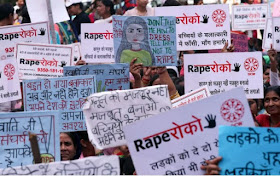[With a Muslim victim and alleged Hindu assailants, the case rapidly became polarized, and two legislators from Modi’s political party were ultimately forced to step down after they attended a rally in support of the accused. Around the same time, a legislator from Modi’s party was arrested for raping a teen in a separate case in the state of Uttar Pradesh.]
By Annie Gowen
NEW
DELHI — Offenders who rape
girls under 12 may now be subject to the death penalty in India, according to
an ordinance passed by India’s cabinet Saturday after a nationwide furor over
the rape and killing of an 8-year-old girl.
In an emergency meeting, India’s cabinet
approved an amendment to the law protecting children from sexual offenses that
will set the minimum penalty for the gang rape of a child under 12 to life
imprisonment or death, and the minimum for the rape of a child to 20 years up
to a maximum sentence of life or death. It also doubled, to 20 years, the
minimum punishment for the rape of a child under 16.
The new ordinance also calls for rape cases
to be investigated in two months and trials to be concluded in the same span,
as well as for new forensic labs and fast-track courts to be added.
Indian Prime Minister Narendra Modi has been
under fire for his response to the crisis sparked by the arrest earlier this
month of eight suspects in the January rape and slaying of an 8-year-old girl
in the northern state of Jammu and Kashmir.
With a Muslim victim and alleged Hindu
assailants, the case rapidly became polarized, and two legislators from Modi’s
political party were ultimately forced to step down after they attended a rally
in support of the accused. Around the same time, a legislator from Modi’s party
was arrested for raping a teen in a separate case in the state of Uttar
Pradesh.
On Tuesday, Indian Nobel laureate Kailash
Satyarthi called rape and child sexual abuse in India a “national emergency,”
with 100,000 such cases pending in courts.
“The whole country was enraged, and it cannot
happen that the central government does not listen to us. Some change will
occur,” Swati Maliwal, the chair of Delhi’s commission for women, told
reporters Saturday. She said she will end a nine-day hunger strike she staged
to protest government inaction over the controversial rapes. Maliwal said she was
happy about the government’s move but said that police still need more
accountability and resources.
But others criticized the ordinance, arguing
that the possibility of a death sentence will not act as a deterrent and that
India needs to improve its prosecution and conviction rate for rape and child
sexual abuse cases. Supreme Court lawyer Karuna Nundy says that the rate of
rapes has not decreased since the death penalty for the crime was introduced in
India in 2013.
“The death penalty is easy political candy to
hand out to angry and upset citizens, but it’s much harder to work on justice
systems that guarantee swift, certain punishment for sexual assault or to limit
the violent patriarchies that cause rape in the first place,” Nundy said.
Swagata Raha, a legal researcher with the
Center for Child and the Law at the National Law School of India University at
Bangalore, wrote an opinion piece Saturday for website the Print, arguing that
the death penalty will make it difficult for children to come forward and
disclose sexual abuse because 94 percent of offenders under India’s child
protection act are relatives or otherwise known to their victims.
“I feel it’s a very reactionary measure, and
certainly not the change those of us who work in this space would like to see,”
Raha said.
In 2012, another highly publicized case, the
gang rape and murder of a young college student, prompted India to tighten its
rape laws and set up fast-track courts. Four men were ultimately convicted and
sentenced to death in that attack. But incidents of reported rape have risen 60
percent since then, to 38,947 in 2016, according to National Crime Records
Bureau data. A 2016 investigation by The Washington Post of nearly 400
fast-track rape courts found that those set up to speed the prosecution of rape
cases do not always have the impact that advocates hope for.
Interviews with lawyers, activists and
prosecutors showed that the quality and success of the courts vary widely. Some
described proceedings bogged down from long waits for forensic evidence, police
reports and repeated adjournments, with witnesses turning hostile and refusing
to testify because they have settled the matter with the family of a suspect.
In New Delhi, for example, there was a backlog of 3,487 cases in the capital’s
fast-track courts, some of which had been languishing for years, The Post’s investigation
showed.
Swati Gupta contributed to this report.
Read more
